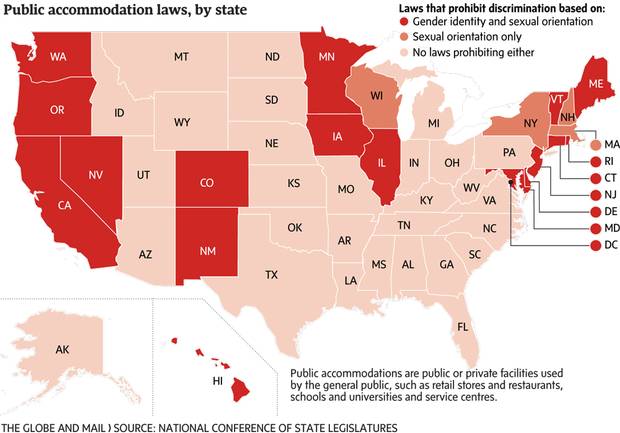
Supporters gather at the North Carolina State Capitol in Raleigh, N.C., Monday in support of House Bill 2, a law that blocks rules allowing transgender people to use the bathroom aligned with their gender identity.
Gerry Broome/AP
Earlier this month, as dusk set over North Carolina's biggest city, one of the tallest skyscrapers in Charlotte lit up with a giant pink triangle – a public statement of support for gay and transgender rights.
The group responsible for broadcasting that statement? Wells Fargo, the largest bank in the United States.
Last month, North Carolina joined a growing number of state legislatures that have either passed or tried to pass bills that could enable discrimination against members of the gay, lesbians and transgender communities. The reaction from various advocacy groups has been swift and overwhelmingly negative; a number of celebrities have canceled appearances in states where such laws are under consideration; myriad local governments, such as the cities of New York and Boston, have also essentially boycotted such states, directing government employees to avoid non-essential travel to those destinations.
But perhaps the most significant negative reaction – and the one that signals the most important shift in the American socioeconomic landscape – has come from the business community. Within just a few days, hundreds of the country's biggest and most well-known corporations have come out in opposition to the proposed laws – not only with strongly worded press releases, but with real economic broadsides.

Canadian rocker Bryan Adams, top, performing at the 2016 Juno Awards, cancelled a tour date in Mississippi in protest over the state’s new religous freedom bill.
Mike Ridewood/REUTERS
This month, shortly after North Carolina introduced a bill that would, among other things, force people to use the public bathroom corresponding to the gender on their birth certificate (a move decried by many as a means of discriminating against transgender people), PayPal announced it was canceling plans to build a new operations centre in the state. The move will cost North Carolina 400 jobs and about $20-million in payroll spending alone.
"Our decision is a clear and unambiguous one," said Dan Schulman, PayPal's President and CEO. "As a company that is committed to the principle that everyone deserves to live without fear of discrimination simply for being who they are, becoming an employer in North Carolina, where members of our teams will not have equal rights under the law, is simply untenable."
On Tuesday, Deutsche Bank announced it is suspending plans to create 250 additional jobs in its North Carolina offices, saying it will not include the state in its U.S. expansion plans as a result of the new law.

The NFL has cast doubts on awarding Atlanta the Super Bowl over Georgia’s similarly focus bill.
Scott Cunningham/Getty Images
Unlike most advocacy groups, which have had to slog through months and years of public votes and expensive lawsuits to overturn such bills, major corporations have been able to exert far more influence by throwing their economic weight around. Earlier this year, after Georgia lawmakers tried to pass a bill that would allow faith-based organizations to deny services to members of the LGBT community, a host of companies threatened to boycott the state. Disney said it would leave Georgia, as did the studio AMC, whose most popular show, The Walking Dead, is filmed there. The National Football League said the chances of a Super Bowl in Atlanta would also be in jeopardy. The tech giant Salesforce also warned it would essentially walk away from Georgia – a similar threat from the company last year helped partially derail a similar measure that was under consideration in Indiana.
In many ways, the looming clash between (overwhelmingly conservative, Republican) state governments and the country's biggest corporations was inevitable. Some of the states with the most business-friendly tax environments in the U.S. also tend to have the most conservative social legislation. Traditionally, many companies were content to reap the benefits of tax breaks without commenting on social issues. But in recent years, the calculus has changed.
Four years ago, Mitchell Gold, the co-founder of a North Carolina furniture maker and retailer, attempted to rally his fellow executives to take a stand against proposed legislation banning same-sex marriage. Many were reluctant, he said. Some wouldn't even take his phone calls or respond to his e-mails.

Bruce Springsteen and The E Street Band play the Izod Center in East Rutherford, N.J., April 3, 2012. Adding to a chorus of condemnations of North Carolina’s new law restricting transgender rights, Springsteen canceled an upcoming performance in the state.
RICHARD PERRY/NYT
Now the tide has turned. This month, more than 100 executives – a who's who of local and national business leaders, from Goldman Sachs to Hyatt Hotels to Bank of America – signed a letter opposing the new North Carolina "bathroom bill" measure.
"People understand this does not make it easier for business, it makes it more difficult," said Mr. Gold.
Experts say that companies are largely motivated by self-interest. "There clearly is an economic rationale for being against these laws," said Brayden King, a professor of management at Northwestern University. Companies "worry if they're seen as complacent or acquiescing to the norms of a [particular] state, it's going to rub off on them." And that can cause problems with their own employees, with the recruitment of future employees, or even with customers.
Despite fierce reaction from national and local businesses, many states have nonetheless doubled down on their proposed legislation. North Carolina enacted its law late last month, and Mississippi approved a similar measure last week. Missouri is debating its own such legislation, as is South Carolina.
"The reality is that in many ways the damage is already done, regardless of whether it passes," said Tom Smythe, associate professor of business and accounting at Furman University in Greenville, South Carolina.
"The fact that I'm talking to you demonstrates the significant impact it could have on business creation and job creation in South Carolina."
The intense focus on a select few states currently in the public spotlight obscures a larger reality: In the majority of U.S. states, it is still legal to discriminate on the basis of gender identity and sexual orientation. However, there are indications the shifting business attitude on such issues is having an impact. After Georgia's legislature authorized its version of a "religious liberty" bill in March, the state governor vetoed it – in part due to strong pressure from businesses. A recent study by Indiana's tourism group Visit Indy found that the state lost as much as $60-million in economic benefits when the state was considering a similar law last year, after a number of groups and organizations decided to host their events elsewhere.
Mr. Gold, whose North Carolina furniture company employs 600 people, said his staff is prepared to discuss the company's stance on the controversial legislation with customers who come in to its stores. "We can explain to customers who come in," he said. "But what about the ones who don't even come in?"

Bigotry, beliefs and bathroom bills
In recent months, a host of U.S. states have passed or tried to pass laws that critics say are aimed at curbing the rights of gay, lesbian, bisexual and transgender citizens.
North Carolina
Law: House Bill 2, which requires public, multi-stall bathrooms and changing rooms be used only by people whose "biological sex," as stated on their birth certificate, matches the bathroom's gender designation. It also bars local municipalities from creating their own anti-discrimination ordinances.
Status: Enacted in March.
South Carolina
Law: S. 1203, a "bathroom bill" similar to North Carolina's, with similar measures banning local municipalities from passing anti-discrimination laws.
Status: Introduced, but faces an uphill climb; the state's Governor said she sees no reason for the law.
Mississippi
Law: House Bill 1523, a law that protects "sincerely held religious beliefs," especially the belief that marriage can only be between a man and a woman, and that sex should only take place within a marriage. It protects people who refuse services to members of the LGBT community based on religious or moral convictions.
Status: Enacted.
South Dakota
Law: House Bill 1008, another "bathroom bill" aimed at forcing people to use the bathrooms that coincide with the gender on their birth certificate.
Status: Passed, but subsequently vetoed by the state's Governor after intense criticism from businesses and advocacy groups.
Georgia
Law: House Bill 757, a law that would have allowed businesses to deny services to certain people based on the religious beliefs of the business owners.
Status: Passed, but subsequently vetoed by the state's Governor. Much like in South Dakota, the bill faced strong opposition from numerous major corporations.
Missouri
Law: Senate Joint Resolution 39, another law which protects "sincerely held religious beliefs," particularly with regards to denying services to certain people.
Status: Cleared the Republican-controlled state senate, and is likely to head to the ballot in August or November, where voters will decide whether it becomes law.
Tennessee
Law: House Bill 1840, a law which would allow counsellors and therapists to refuse treatment to certain individuals based on "sincerely held" convictions. (The state is also considering its own version of a transgender-targeting "bathroom bill.")
Status: Passed. Now goes to the state's Governor, who has not indicated whether he intends to veto it.
Giving voice to protest
In recent weeks, a number of celebrities have responded to the slew of new legislation in some American states.
- Bruce Springsteen has cancelled a show in Greensboro, N.C., over the state’s new so-called “bathroom bill.” In a statement, Mr. Springsteen said the law was “an attempt by people who cannot stand the progress our country has made in recognizing the human rights of all of our citizens to overturn that progress.”
- Canadian musician Bryan Adams has also cancelled a stop in Biloxi, Miss., in protest of a new law that allows religious groups and some businesses to refuse service to members of the LGBT community. “I cannot in good conscience perform in a State where certain people are being denied their civil rights due to their sexual orientation,” Mr. Adams wrote in a statement.
- Jimmy Buffett also came out against the new laws, calling North Carolina’s legislation “stupid.” Mr. Buffett said he is not canceling two shows already scheduled in the state, but future appearances will depend on whether the law is ultimately repealed.
- National Basketball Association legend Charles Barkley has also voiced his opposition to the North Carolina law. The basketball star, who previously spoke out against a “religious freedom” bill in Indiana last year, has called on the NBA to reconsider holding its 2017 All-Star game in Charlotte.